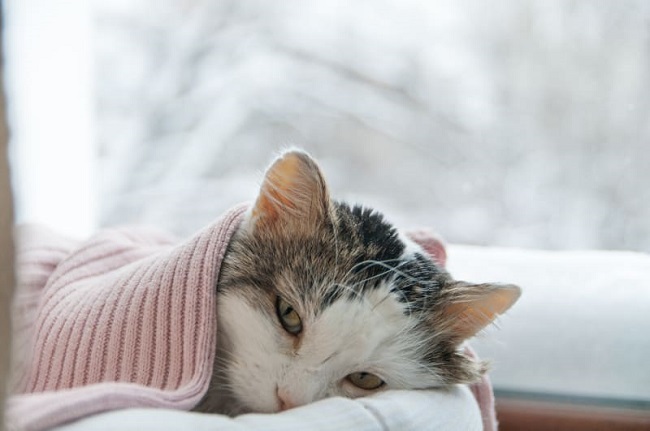Cats, just like humans, can catch a common cold. And as any caring cat owner knows, it’s distressing to see your furry friend feeling unwell.
Luckily, there are several home remedies to help alleviate your cat’s discomfort. However, it’s important to understand that these remedies should complement, not replace, professional veterinary care.
In this article, we’ll delve into 7 home remedies for cats with colds, discuss what not to do, and understand what causes a cat to develop a cold.

7 Home Remedies for Cats with Colds
1. Keep Them Hydrated
Just like in humans, hydration is crucial for cats suffering from a cold. Fresh, clean water should always be available. If your cat is reluctant to drink, try giving them a little low-sodium chicken broth.
Read Also:
2. Maintain Good Nutrition
A well-fed cat is a cat well-equipped to fight off a cold. Encourage your cat to eat by providing their favorite foods or warming their meals slightly to enhance the aroma.
3. Create a Comfortable Rest Area
Ensure your cat has a warm, comfortable place to rest. A cozy bed or blanket in a quiet area can do wonders for a cat recovering from a cold.
4. Use a Humidifier
Dry air can exacerbate a cat’s cold symptoms. Running a humidifier can help moisten your cat’s respiratory tract, easing their discomfort.
5. Keep Their Eyes and Nose Clear
Cats with colds often have runny eyes and noses. Gently wiping their face with a warm, wet cloth can help keep them comfortable.
6. Avoid Smoke and Other Irritants
Smoke and other air irritants can worsen your cat’s cold symptoms. Keep your cat’s environment as clean and smoke-free as possible.
7. Provide Lots of TLC
Never underestimate the healing power of tender loving care. Spend time with your cat, offering comforting strokes and soothing words.
What Not to Do When Managing a Cat’s Cold
While home remedies can provide comfort, there are certain things to avoid when caring for a cat with a cold. Do not give your cat human cold medication, as it can be toxic. Avoid forcing your cat to eat or drink if they’re unwilling. Always consult a vet if symptoms persist or worsen.
What Causes a Cat to Develop a Cold?
Cats commonly catch colds from viral or bacterial infections. The most common are Feline Herpesvirus and Feline Calicivirus. Cats with weakened immune systems, such as kittens, older cats, or cats with chronic illnesses, are particularly susceptible.
The Importance of Regular Veterinary Check-ups
Even when your cat seems perfectly healthy, regular veterinary check-ups are vital. These check-ups can detect early signs of potential health problems, such as a cold, and allow for prompt treatment.
Feline Vaccinations
Vaccinations are crucial to prevent many common causes of a cat cold. While they may not completely eliminate the chance of your cat catching a cold, they will reduce the severity and duration of illness.
Understanding Your Cat’s Behavior
Cats are experts at hiding their discomfort, making it essential to understand your cat’s normal behavior. Any changes in eating, drinking, or litter box use, or signs of discomfort or lethargy, could be an indication of a cold or other health issue.
Encourage Proper Hygiene
If you have multiple cats, proper hygiene can prevent the spread of colds. Separate food and water dishes, litter boxes, and bedding can all help to keep a cold contained if one of your cats is infected.
The Role of Proper Nutrition
Proper nutrition plays a significant role in your cat’s overall health and immunity. Ensure your cat receives a balanced diet with high-quality ingredients to keep their immune system strong and capable of fighting off infections like the common cold.
Read Also:
Conclusion
Caring for a cat with a cold can be challenging, but with a little patience, plenty of love, and the right home remedies, you can help your feline friend feel better. Always remember that these remedies are not a replacement for professional veterinary care.
If your cat is showing symptoms of a cold, it’s important to consult with a vet to ensure proper diagnosis and treatment. After all, our furry friends rely on us to keep them healthy and happy.
























